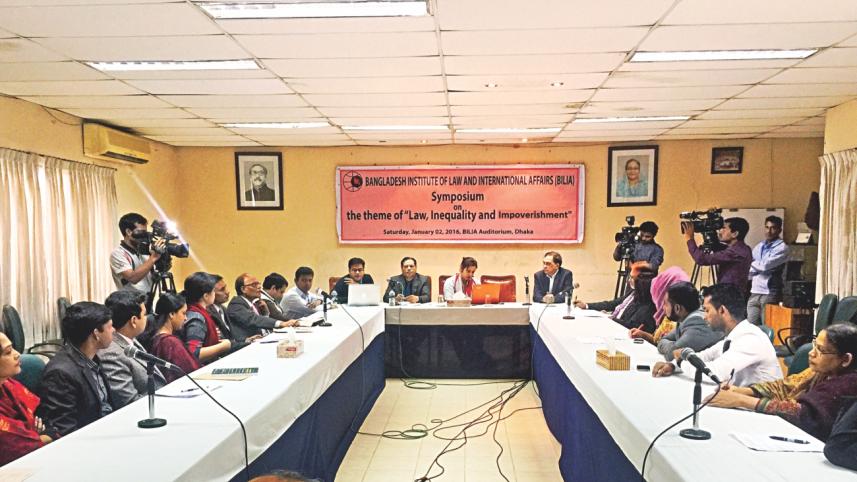Poverty and legal empowerment

Legal empowerment of the poor is seen as a pre-condition for eradication of poverty today. But are the global anti poverty programmes really bringing the needed relief to the world's poor? What is the position of urban population living in extreme poverty in this regard? Exploring the much needed answers to these questions, two renowned researchers spoke in a symposium before a concerned audience on Saturday, January 2nd 2015.
This successful symposium was conducted by Bangladesh Institute of Law and International Affairs (BILIA) on the theme of “Law, Inequality and Impoverishment”. The first speaker was Mr. Mostafa Haider, who is an existing Resident Fellow at the Institute for Global Law and Policy at Harvard Law School, and a doctoral candidate at the University of Sydney. The second speaker Ms. Cynthia Farid, is also a doctoral candidate and Law and Society Graduate Fellow at the University of Wisconsin Law School. Dr. Mustafizur Rahman, Executive Director, Centre for Policy Dialogue (CPD) was the chair of this event and Dr. Shahdeen Malik, Honorary Director of BILIA acted as the host.
In his speech Mr. Mostofa explained how current measures to solving global poverty are leading to legalisation of radical inequality. He made a valuable critique of an international report entitled 'Making the Law Work for Everyone', prepared by an independent Commission on Legal Empowerment of the Poor in 2005. He claimed that legal empowerment of the poor, in contrast to the claim by the 2005 report, does little to challenge the normative basis that legalises inequality. Later on Ms. Cynthia presented the nature of structural injustices toward the urban poor mediated by the elite from a historic-political perspective. Focusing on the situation prevailing in Dhaka, she suggested that law can also be a means for a more just and egalitarian society by addressing important structural issues.
Open discussion by the participating academicians, researchers and legal practitioners followed the presentations. Many key activists in legal empowerment including Honourable Justice Muhammad Imman Ali of the Appellate Division of the Supreme Court of Bangladesh, Ms. Sara Hossain, Honorary Executive Director of Bangladesh Legal Aid and Services Trust (BLAST) and Professor Syed Saad Andaleeb, Vice Chancellor, BRAC University added their expressive remarks making the symposium truly productive.
The event was covered by Md Mustakimur Rahman and Preeti Kona Sikder, Legal research assistants at BILIA.



 For all latest news, follow The Daily Star's Google News channel.
For all latest news, follow The Daily Star's Google News channel.
Comments